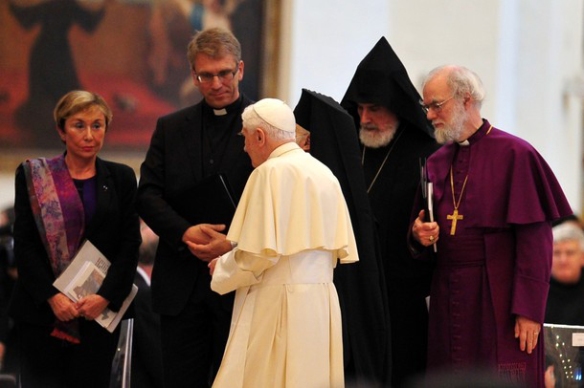The only thing better than exposing famous atheists as believers as I did with Sartre and Camus is enlisting the help of atheists in unpopular ecclesial causes. I sense the tide has turned, especially for Neo-Cons, on John Paul II. Their attempts to baptize capitalism and every American war with the aid of JP2 have fallen short. A surprising number of them now busies themselves taking the same sorts petty pot shots at Wojtyla they once hated from liberal Catholics (I won’t stoop to linking their attacks).
I would argue being in the crosshairs of both sides of the theological spectrum is a good place to be. But don’t let me make the argument. I’ll let Julia Kristeva, an atheist, feminist, and psychoanalyst make it for me. (She also appeared at the 2011 World Day of Prayer for Peace in Assisi. You can read her call for peace between humanists and religionists here.)
Why is John Paul II significant according to her?
“‘Don’t be afraid of Christianity, and together we won’t fear religions!’ I find myself wanting to say to my agnostic, humanist, atheist friends. We hail from the same continent of thought, we often rise up ‘against’ each other because we are in reality ‘right against’ one another; let us continue our analyses . . . And I have a dream: may true complicities, essential in our face to face with the rise of barbarity, be woven not only, and to my way of thinking less, between Christianity and the other religions today tempted by fundamentalism, but between Christianity and this vision to which I adhere that grows out of Christianity, although it is detached from from it today, and has the ambition to elucidate the perilous paths of freedom. In his person and his acts John Paul II made this possible. Far more than sainthood, this pope has shown us his universal dimension.”
She made this statement in reaction to the pope’s passing and after re-reading his phenomenological treatise Person and Act, which is unfortunately only available in a botched translation entitled The Acting Person (which still might be available somewhere online). However, Kristeva forgets how the “continent of thought” she’s talking about was created by the Christian revolution and cannot be detached from it so easily.
Let’s not get bogged down in the details, but it is true that without the fundamental Christian revolution we wouldn’t notice whole classes of people. The Greeks, Romans, the Enlightenment (we should remember on the Fourth of July), and Nietzsche didn’t make much of the weak and dependent other than sporadically wanting to eliminate them.
And so it’s important to note Kristeva also thinks the greatness of John Paul II consists in his witness of weakness:
“[I’m never sure whether the original French or the translation is jumbled when it comes to Kristeva. But I’m sure you’ll get the point, ed.] On that day, and up to his death, we saw a handicapped man expose himself. All those handicapped citizens, their families, and those with whom I work to have the rights of these excluded people, not like the others, recognized, know the difficulty, or even the impossibility of ensuring that the dignity of the most vulnerable, those who make us face up to deficiency and psychic or physical death, was respected. Whereas society, dogged by the cult of performance, of excellence and enjoyment, makes manifest the shortcomings of this culture of mutual assistance and, beyond, of the identification with the suffering of Christ on the Cross or the ease in Christian sadomasochism that John Paul II successfully maintained even on his deathbed, the body of the handicapped pope was and remains and invitation to know life up to its limits. And to develop this solidarity with people who are dependent–the handicapped or the aged–which modern humanism has so much difficulty doing.”
You can read more of her thoughts on Catholicism, especially John Paul II, in her collection of essays, This Incredible Need to Believe.


